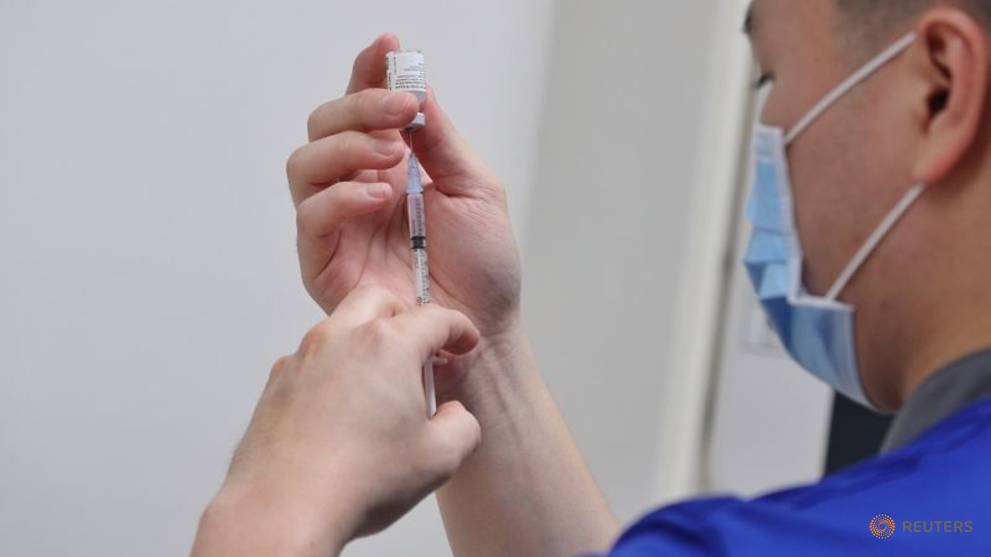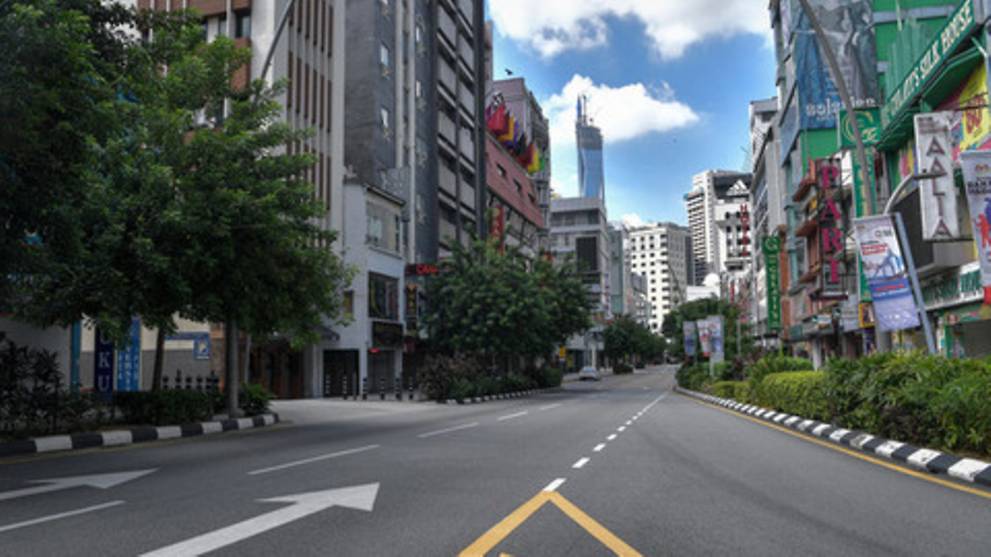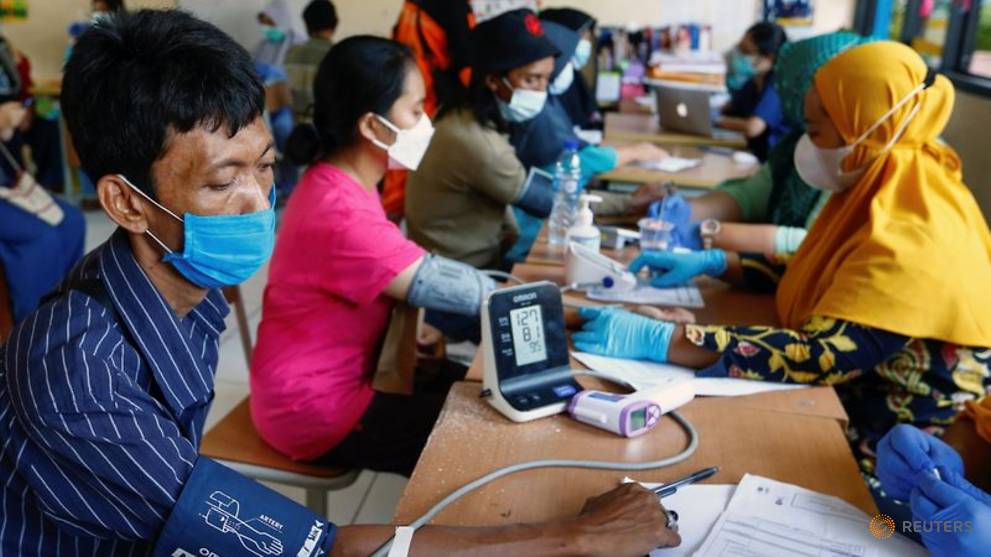
SINGAPORE: There may be a "very small risk" of heart inflammation after the second dose of an mRNA COVID-19 vaccine, said the government-appointed expert committee on COVID-19 vaccination in Singapore.
In a media release on Friday (Jun 11), the committee said it is closely monitoring international reports that the second dose of mRNA COVID-19 vaccines may be associated with a small risk of myocarditis and pericarditis in young men.
Myocarditis and pericarditis are inflammatory conditions that affect the heart muscles and the outer lining of the heart respectively.
Increased occurrences of myocarditis and pericarditis after the second dose of mRNA COVID-19 vaccinations have been observed in Israel and the United States, and in adolescents and young men younger than 25 years.
Singapore uses the Pfizer-BioNTech and Moderna vaccines for its national vaccination programme. Both are mRNA-based vaccines.
READ: Israel sees probable link between Pfizer COVID-19 vaccine and small number of myocarditis cases
In a separate update, the Health Sciences Authority (HSA) said Israel, which uses the Pfizer-BioNTech COVID-19 vaccine, recently announced that there may be a probable link between the second dose and the onset of myocarditis in men aged between 16 and 30 years old in its population.
The link was found stronger among the younger age group of 16 to 19 years old.
While no other country has highlighted a similar causal link to date, the US Centers for Disease Control and Prevention (CDC) has reported that it has observed more cases of myocarditis and pericarditis in male patients aged between 16 and 24 years old.
"Nonetheless, they have stressed that investigations are ongoing, and they have not made any conclusion about a causal link," said HSA.
MOST CASES ARE "MILD", SIX SUCH REPORTS RECEIVED BY HSA
Myocarditis and pericarditis occur more often in men compared to women. Symptoms include chest pain, shortness of breath or abnormal heartbeats.
Most cases are mild and patients recover without the need for significant intervention, nor do they suffer from any long-term effects. The expert committee added that very rarely, severe cases may result in damage to the heart muscles.
READ: EU adds another rare blood condition as side effect of AstraZeneca COVID-19 shot
The two conditions are separate and distinct from heart attacks, which are caused when the blood flow to the heart is blocked.
In Singapore, HSA said it has received six such reports as of Jun 7. Two of the cases involved a man and a woman older than 40 years old. The other four cases involved men aged between 18 and 30 years old.
"(The four cases) are at the upper end of the expected range for this age group, based on background incidence rates," said HSA.
Most of the cases were reported to have occurred within a few days after receiving the second dose of the vaccine. All have recovered or have been discharged well from the hospital.
Although the local numbers are small, the pattern of occurrence after the second COVID-19 vaccine and in young men is consistent with what has been observed in the US and Israel, which are the two major users of the mRNA vaccines, said HSA.
Those who developed myocarditis and pericarditis responded well to treatment and recovered, added HSA.
READ: 'No evidence' inactivated virus vaccines more efficacious against COVID-19 variants than mRNA ones: Singapore expert committee
"Overall, the benefits of the Pfizer-BioNTech and Moderna COVID-19 vaccines continue to outweigh the known risks of COVID-19 disease and its severe complications in a pandemic," it added.
The authority has also informed the Ministry of Health (MOH) and the expert committee of its assessment.
"We will also continue to monitor this closely and take the relevant and necessary regulatory actions," said HSA.
The committee said it has reviewed the available international and local data.
"Our assessment is that the benefits of receiving the mRNA COVID-19 vaccines, i.e., reduction in COVID-19 infections and severe complications even if infected, continue to outweigh the risks of vaccination."
AVOID STRENUOUS ACTIVITY ONE WEEK AFTER SECOND DOSE OF VACCINE
As further studies and investigations are ongoing, the currently available data suggests that there may be a "very small risk" of myocarditis and pericarditis after the second dose of an mRNA vaccine, particularly in young men, said the expert committee
As a precaution, the committee recommended that those vaccinated, particularly adolescents and younger men, should avoid strenuous physical activity for one week after their second dose.
They should also seek medical attention promptly if they develop chest pain, shortness of breath or abnormal heartbeats.
"COVID-19 continues to be a health threat globally and in Singapore.
"The emergence of infectious variants can lead to widespread community COVID-19 transmission as well as the risk of severe COVID-19 disease and complications, including long term chronic complications," said the committee.
It that the benefits of mRNA COVID-19 vaccination continue to outweigh the known and potential risks.
HSA and MOH will also continue to monitor the safety profile of the COVID-19 vaccines closely and update members of the public of any significant safety concerns detected with the vaccines.
BOOKMARK THIS: Our comprehensive coverage of the coronavirus outbreak and its developments
Download our app or subscribe to our Telegram channel for the latest updates on the coronavirus outbreak: https://cna.asia/telegram
https://news.google.com/__i/rss/rd/articles/CBMic2h0dHBzOi8vd3d3LmNoYW5uZWxuZXdzYXNpYS5jb20vbmV3cy9zaW5nYXBvcmUvY292aWQtMTktbXJuYS12YWNjaW5lLXNtYWxsLXJpc2staGVhcnQtaW5mbGFtbWF0aW9uLW1vaC1oc2EtMTQ5OTU3ODbSAQA?oc=5
2021-06-11 16:39:11Z
CBMic2h0dHBzOi8vd3d3LmNoYW5uZWxuZXdzYXNpYS5jb20vbmV3cy9zaW5nYXBvcmUvY292aWQtMTktbXJuYS12YWNjaW5lLXNtYWxsLXJpc2staGVhcnQtaW5mbGFtbWF0aW9uLW1vaC1oc2EtMTQ5OTU3ODbSAQA



